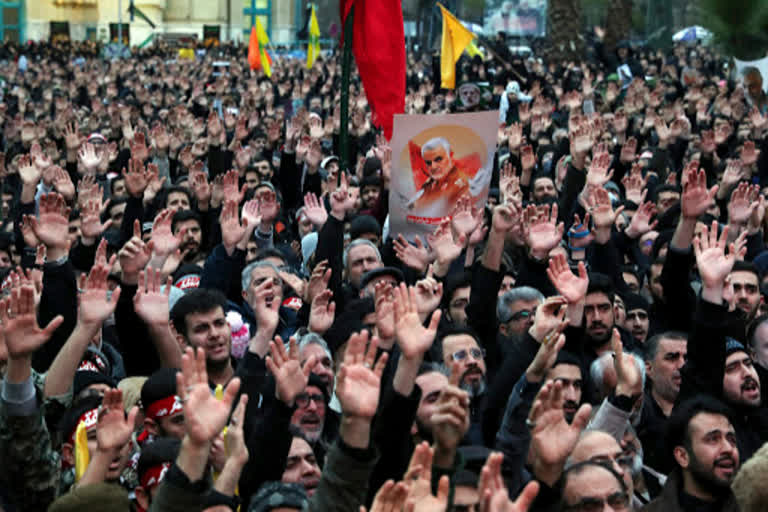Hyderabad:The assassination of General Qassem Sulemani, 62, through a missile attack ordered by US President Donald Trump in the early hours of Friday morning is unlikely to go un-avenged by the angry Iranian government.
Suleimani never thought that he could be killed- so many close shaves he has had since he became the commander of the al-Quds force- the external arm of Iran’s Revolutionary Guards (IRGC) some 22 years ago.
He seemed to enjoy the immunity from those whom he was perceived to be fighting against. Otherwise, there was little reason why he was not attacked by the US after it occupied Iraq in Operation Desert Storm. While it will take some time to ascertain the real reason behind this dark assassination of Suleimani, what is apparent is that his going away will hit the bilateral and financial ties that Iran forged with many countries. India is no exception.
India, which perceives Iran as a member of its extended neighbourhood and endeavours to invest considerable funds for the development of Chabahar, located at the Southeastern part of the country at the Makran coast, is in a conundrum about how it should respond to this assassination.
Walking on eggshells as it can antagonize neither Iran nor Washington- it decided to take cognizance of the death of the Iranian General without condemning it. That may make the US happy but may not find favour with Tehran, which has stepped out of its way to grant a 10-year management lease for Shahid Beheshti port at Chabahar.
Chinese, who have invested heavily in nearby Pakistan’s Baluchi port of Gwadar were keen on building Chabahar, too, but Iran had its own strategic reasons to give it to India.
The Iranian port, which is located in the sea of Oman is India’s first overseas investment, which allows it to sidestep Pakistan and helps rebuild its land route with Central Asia.
The Chabahar port, which has had many suitors from the days of Tsar Russia’s quest for a warm water port, finds mention in travel writings of Al-Beruni as the starting point of Hindustan.
Expectedly, the Indian investment in this port city represented a natural fit. During a visit to Chabahar, this writer found people speaking Hindustani with ease and happy with India’s foray.
Iranian diplomats never shied away from mentioning that they wanted Indian presence in close proximity to the Pakistan border. It was from Chabahar that Indian national Kulbhushan Jadhav, accused of being a spy by the government of Pakistan was picked up.
There are two components to the Chabahar project, the port, and the road and rail network that connects the port to the cities of Iran and Afghanistan.
Indian Prime Minister Narendra Modi, Iranian President Hassan Rouhani and Afghan President Ashraf Ghani signed the agreement in 2016.
This agreement was premised on the assumption that the nuclear deal with _P5+1 country would allow Tehran to return to international fold allowing them to access the international banking channels to facilitate trade and commerce with other countries.
This assumption was challenged after US President Donald Trump came to power and withdrew from the Iran deal and re-imposed sanctions on Iran.
